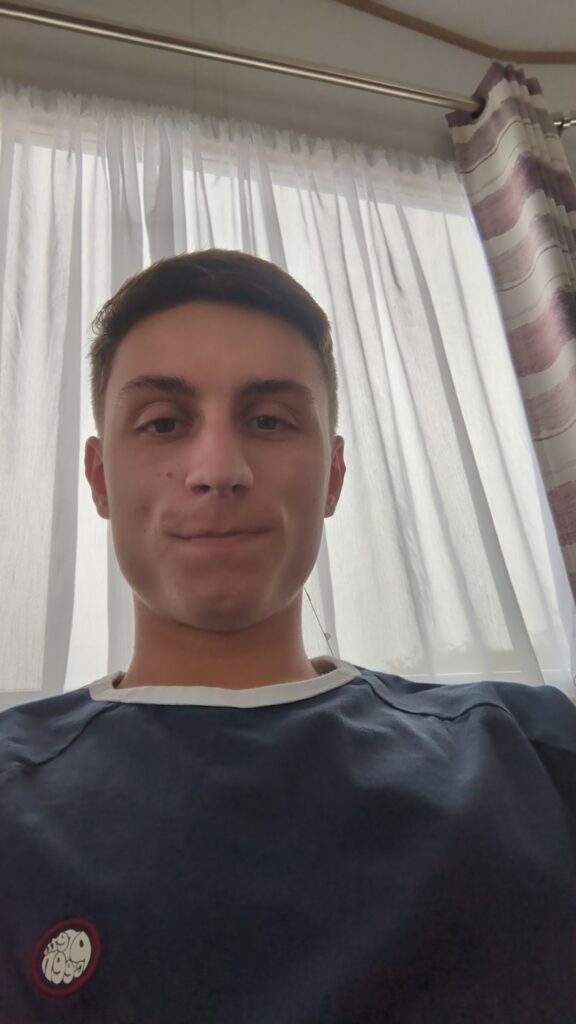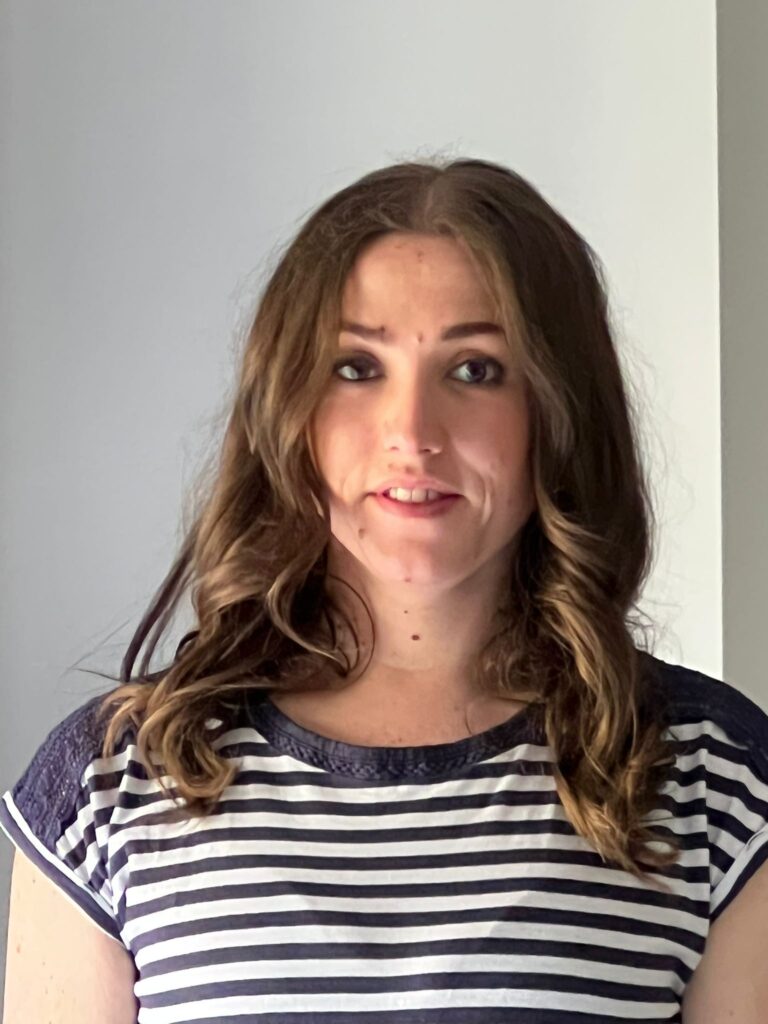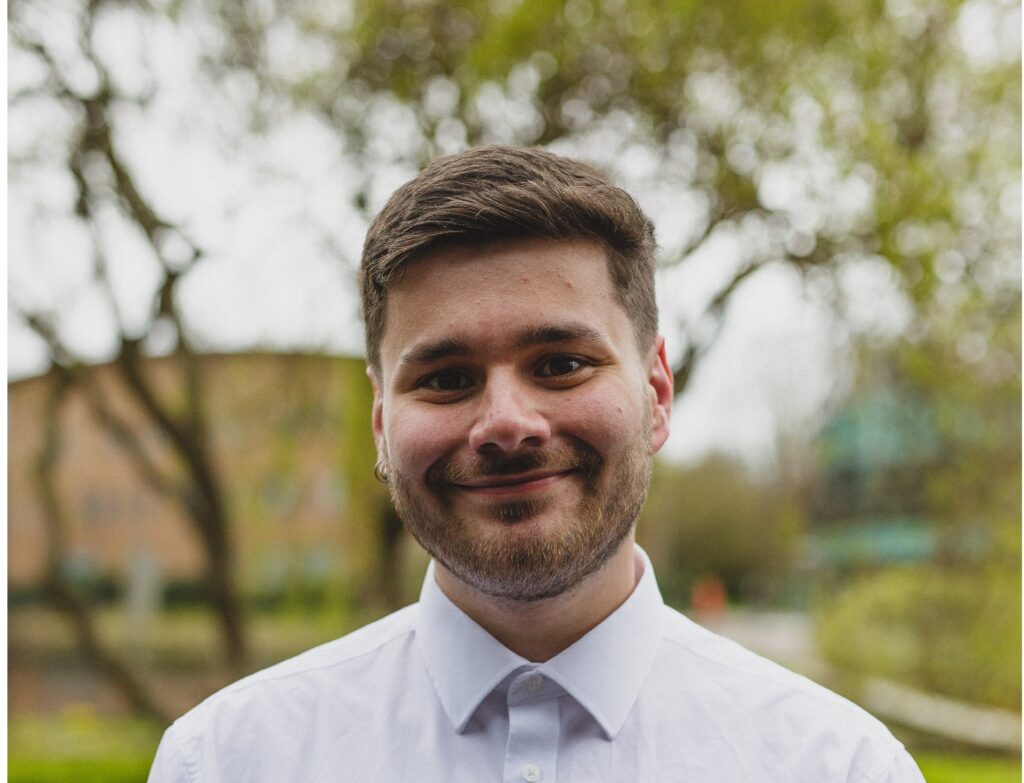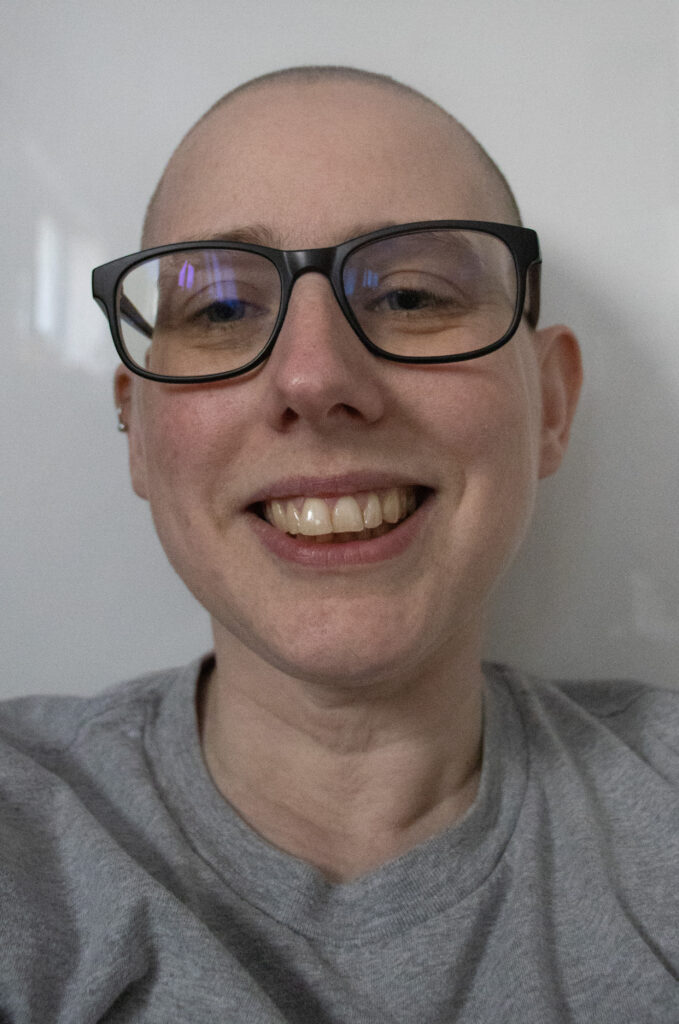Library and Learning Services has recently welcomed new members to our existing team of Student Advisors. They are all current Edge Hill students who bring a wealth of experience and knowledge from their own studies. You might have had the chance to meet them them during our Welcome Week events and the Find Your Feet drop-in workshops last month. Keep reading to discover more about the team and the valuable #EHUStudyHappy tips they have to offer!
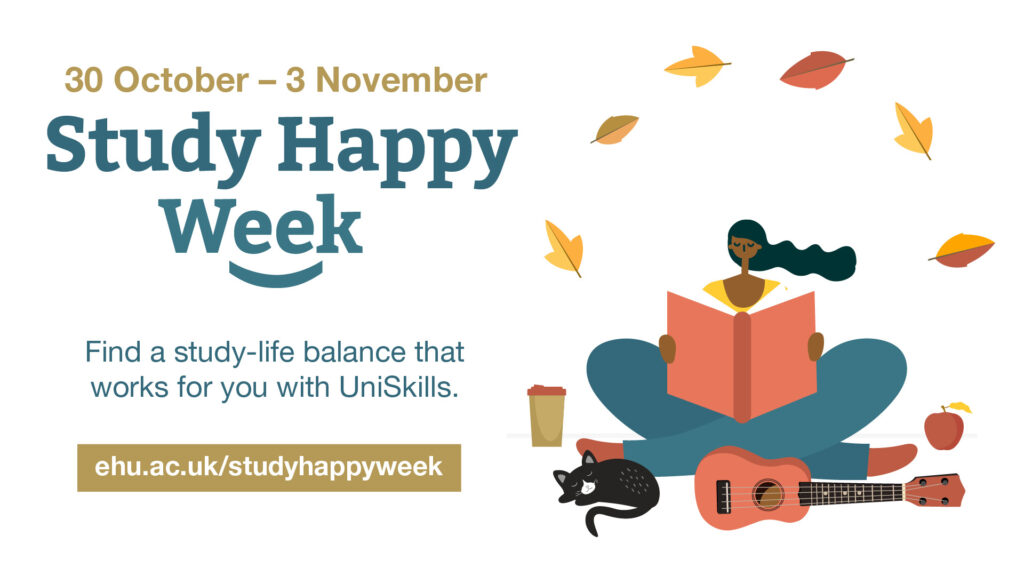
Lewis Underwood – 3rd year BA (Hons) History
Hi, my name is Lewis Underwood, and I am a third year BA Hons History student. What I love most about my degree are the lessons we can learn from the past and the parallels we can draw between the modern day and history.
My top study tip would be to do a little a little bit of work more often rather than leaving things to the last minute. For example, if you know you have an essay due in a month’s time, rather than forgetting about it until 2 weeks before the deadline, work on it from a month before. This will prevent a lot of stress closer to the deadline and you will thank yourself for it! Even if that just involves reading journal articles, it will be more beneficial than doing nothing.
Michelle Hopwood – 3rd year Business and Management with Leisure and Tourism
I am a current 3rd year undergraduate studying Business and Management with Leisure and Tourism. I’m a well organised person and use a range of tools to ensure a good study life balance. Firstly, I treat my degree as my full-time job, setting my ‘working hours’ 8-6pm to allow for breaks. I map out my weekly schedule into a timetable so I can identify my free and dead time and use Outlook calendar and the to-do list function to record all the things I need to do each week. I enjoy using my dead time, between lectures and seminars to do reading, go for a walk or listen to a podcast. I also thoroughly read the module handbooks to ensure I have identified how the weeks are scheduled and any weeks when classes may not be scheduled. This allows me to plan those weeks more constructively such as by working on assessments.
I use Trello to note all tasks I need to complete for each assessment, having a list for each module that I can then check off as completed. It feels good to see tasks being moved to the completed column as the year goes on. I am known for using the Kanban method for managing my assessment tasks in a more tangible way, there are lots of LinkedIn Learning courses on how to it. I love to see those post-it notes moving around my board as I complete tasks. The Pomodoro app is great for ensuring I time block my work to include breaks otherwise I would just keep working. It wasn’t until I was in my second year that I learnt the importance of taking study breaks!
I always make sure my uni back is packed the night before to avoid that morning rush which enables me to arrive at uni focused and ready. A real important way of finding a study-life balance is banning uni-talk with friends and family and setting this boundary enables me to focus on my personal relationships and remind myself there are other important life achievements outside studying too.
Emma Campbell – MSc Physician Associate Studies
Hi, I’m Emma and I am currently studying for an MSc in Physician Associate Studies having previously completed a BSc in Biomedical Science. As my course is very intense, getting a good work life balance is crucial for both my physical and mental health. Some of my tips which I have learned from both my degrees to help achieve this important balance include:
- Taking regular breaks away from the area you are studying in.
- Meal prep (batch cooking) at the weekend – gives you the chance to make healthy meals but conveniently they just need to be heated up when busy – no need for supermarket ready meals!
- Set a deadline for when studying is finished for the day and allow some time to switch off and relax.
- Organise or dedicate time to go to exercise classes/spend time with friends.
- Get out the house either for exercise or walks as often as possible to refresh your mind.
- Study in places outside of your room, for example the Catalyst. A different location really helps motivate studying especially in a purpose built study area with no distractions.
- Don’t be afraid to ask for help with work and organising your work/life balance. Remember your Academic Advisors are here to help with this.
To stay organised I like to use a weekly planner to plan the work I need to do, what deadlines I have and also from this make ‘to do’ lists for the day. This way I cannot miss anything and get the satisfaction of ticking things of my ‘to do’ list! In my study breaks or time spent not studying, I like to cook, bake, read, Yoga/Pilates, watch YouTube or TV and drink too much caffeine!
Rosie Sumner – MA Critical Autism Studies
My name is Rosie and I’m studying an MA in Critical Autism Studies which is also a topic close to my heart as an Autistic person. Reflecting on how I felt before I started university I was so excited yet apprehensive about adapting to a completely new way of life and meeting new people. I was worried that I wouldn’t be able to deal with the unfamiliarity of a new place, routine, people and things to learn. I’ve learnt a lot since then about managing these worries and daily challenges to become and independent learner and maintain a study life balance. I’ve developed so much as a person and everyone’s journey of growth whilst at university is unique. Hopefully our study and wellbeing tips will help you along your own journey and make that exciting yet daunting road ahead more manageable.
- Plan ahead to avoid overwhelm and leave room for flexibility. start by planning at the beginning of each week until you establish a solid routine.
- Research useful apps and tools that can help with executive disfunction and planning such as calendar and study apps that encourage you to stay off your phone!
- Schedule and timetable visually by using a wall planner or academic diary. Break down big to-do lists in order of short, mid and long-term goals to help you prioritise tasks.
- Remember to avoid burnout and that sometimes rest will be more productive than forcing yourself to work. Create an evening routine that helps you to wind down so you can establish that your body needs rest if it’s something your brain struggles to communicate. Ensure that you develop interests and hobbies that are separate from your studies to create a safe space for you to practice differentiating between down time and studying.
- Make use of the UniSkills Team! They were a fantastic help when I first started university and have continued to support my academic progress throughout my degree. They run helpful workshops and one-to-one sessions that can help you adapt to writing and studying at degree level. There are a lot of new skills that are vital to learn when you first start university. One of the biggest worries of mine was that I would be too nervous to do well in group projects and assessed presentations and used to dread the thought of presentations but now with the help of the UniSkills Team and my department, presentations are something I actually really enjoy doing. I also took part in the UniSkills workshops on academic resilience where I learned some of the most insightful information that has continued to help me face challenges and manage anxiety whilst thriving academically.
Thomas Jones – BA (Hons) Politics and Sociology
Hi everyone, my name is Tom and I am a third-year politics and sociology student. This is my second year being a Student Advisor and I am so honoured to be able to help support new and current students across the university with their assignments where I provide academic support tips, tricks and wisdom. I love being a part of the UniSkills workshops as a chat buddy where I provide links and suggestions for students. This is a rewarding part of the role, as it is great to see the students feeling supported and more confident in their ability.
Outside of the role, I conduct research on various topics and I have had numerous papers published. I also love to read and always have a book on the go! I am also a concert fanatic as love seeing my favourite artists live. I was lucky enough to get tickets to see Taylor Swift and Olivia Rodrigo next year, both of whom I love to listen to when working and reading.
To keep up with such a busy life, my calendar is my best friend. When I am planning events, I love to add to my personal calendar. For when I need to complete academic work, I use To Do, a Microsoft application, which all students have access to through the student portal. This helps me keep up to date with all the deadlines and keeps me focused on what needs to be done daily.
When I am not doing research or academic work (a rarity) I love to go on walks with my partner to get some fresh air and enjoy nature. Being able to have a nice warm coffee and a sweet snack on a long walk is such a lovely experience, despite getting muddy and wet!
Emma Davison – BA (Hons) Software Engineering
Hi, I’m Emma. I’m a mature student with dyslexia-type symptoms caused by my cerebral palsy. My first question when I started university was, “Will I cope with the pressures of university study?”
Although I was provided software tools through Disabled Students Allowance (DSA), I didn’t know how to create academic material. For those who work visually like me, access to software such as Inspiration 9 and Read&Write on campus computers makes studying more manageable. There is also Using Assistive Technologies at University toolkit that provides guides you on using the software. I would have been lost without the UniSkills workshops, and I doubt I would be on track for the First that I am had I not had access to these, especially as they are all compatible with Inspiration and Read&Write.
Some of the workshops I found most useful were Introduction to Academic Reading, Develop Your Academic Writing, Using Harvard Referencing, Become a Paraphrasing Pro and Grow Your Academic Resilience. All workshops can be booked via the Student Life Portal and if you filter by the UniSkills event type all the available workshops will be visible. You can attend them as often as you like, and bookable one-to-one appointments are available if needed. I recommend joining a session if you want to develop your skills further.
The referencing tool RefWorks saves academic material easily, has a plugin for Microsoft Word and will generate your reference list. However, I recommend double-checking the citations and reference list against your referencing guide because they may need tweaking to meet the current standards. Links to the correct referencing guide can be found on the UniSkills webpages or on your Subject Resource page.
Rebecca Bailey – MA Nineteenth-Century Studies
I’m Rebecca, currently an MA student in Nineteenth-Century Studies with an undergrad in Creative Writing. As someone whose university life has focused on reading, reading, and more reading for four years, it’s been really important for me to develop my own habits and tricks to stay focused and happy at the same time. Coming into university with a history of battling with my mental health meant that it was initially a little scary, and my anxiety has often got the best of me at the worst of times. But just because it can get hard, doesn’t mean you can’t reach even your biggest goals.
One of my most important study tips is to BE GENTLE with yourself. This is something that takes a lot of practice, but I’ve found I work best when I take everything one step at a time and celebrate even small victories. Where you can, try and space all your work out and set little targets for each day – don’t try and cram everything into one late night library session, and don’t get upset with yourself if some days you do less than you wanted. Everyone’s best changes all the time, so make some space in your planning for this and try to give yourself enough time to accommodate for different levels of energy and work capacity before the deadline comes up. For example: if you have an essay due in a month, chip away at it every other day, setting rough goals for a paragraph or 250 words. If you’re feeling good and go over that, then you can get it done a little early! If you have a stressful day or week, it means you can still reach that hand-in deadline without extra worry.
Another thing I do to give my brain the chance to relax is frequent study breaks. This can be anything from going for a walk – which is always a great option, especially if you study a lot in your room – to switching to something low impact for ten minutes like sorting out a to do list. And, if you’re studying with a friend, it’s always a great option to have a chat about anything other than your work. Friends and family are a go to for me when it comes to keeping a good study balance, especially whenever I’m feeling particularly overwhelmed.
We hope you’ve enjoyed reading all about our wonderful Student Advisors and discovering their top #EHUStudyHappy tips. Don’t forget you can also meet them at at the #NextSteps drop in (Tuesday, Thursday 12-2 Catalyst ground floor) and workshops (Wednesday 12-1, Friday 11-12) running all this week.
Good luck with your studies and Study Happy!

